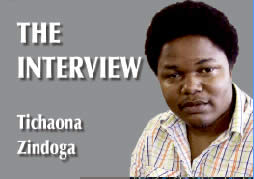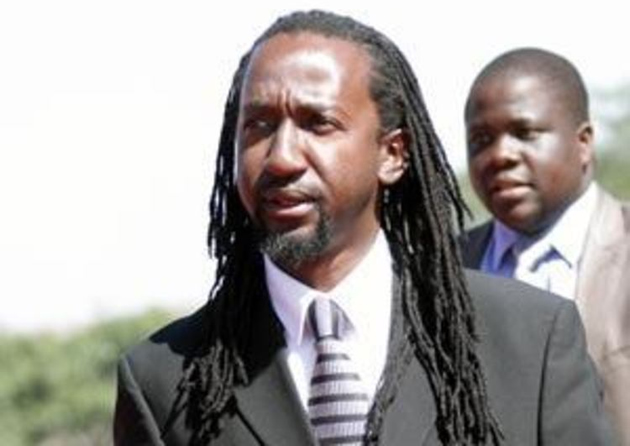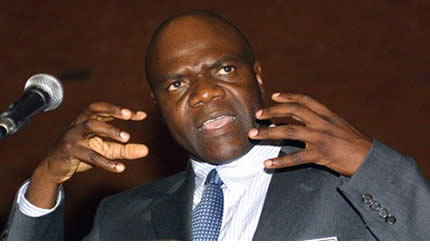‘Indigenisation can co-exist with FDI’

Cde Patrick Zhuwao (PZ)was last week appointed Minister of Youth Development, Indigenisation and Economic Empowerment. He has to manoeuvre the tide of perception and practical realities of creating wealth to the majority of previously marginalised Zimbabweans. He says he is up to the task and tells our Political Editor Tichaona Zindoga (TZ) that indigenisation should not necessarily scare away investment. Read on…
TZ: You were recently appointed Minister of Youth Development, Indigenisation and Economic Empowerment. Quite an onerous task lies in your way…
PZ: Well, I am highly elated that the President had enough confidence to appoint me to this. It’s actually quite overwhelming because what it means is that I have a significant amount of pressure pushing me to deliver and that delivery should be delivery to the President as my principal. The President obviously is expected to deliver to the people of Zimbabwe because the people of Zimbabwe elected him. So, this means that I will end up being guided largely by the Zanu-PF manifesto that President Mugabe used when he sought re-election in 2013.
TZ: One might think that over the past year, despite what you have said that indigenisation anchored the last manifesto, the talk about indigenisation had somewhat cooled off and foot taken off the pedal. How do you think you’re going to approach the indigenisation agenda given that it is really an emotive issue?
PZ: Indigenisation is underpinned by a legal instrument. It is underpinned by an Act and it is underpinned by subsidiary legislative instruments in the various statutory instruments that have been promulgated in support of the Indigenisation and Economic Empowerment Act being specifically General Notice 114/459 of 2011 and General Notice 280 of 2012 as well as Statutory Instrument 66 of 2013. So it is really not an emotive issue and it is by no means an issue of personal interpretation. There are laws that guide indigenisation.
TZ: Ok, but you being appointed the minister may mean, according to some people, that you are the new bogeyman for foreign investors. How can Zimbabwe balance off national interest in the indigenisation agenda as pronounced by the revolutionary party and the need to have FDI? And you wouldn’t want to be a bogey yourself?
PZ: Let me point out that I am answerable to the President of the Republic and the President of the Republic gets his mandate from the people of Zimbabwe and therefore what I must do must be in support and for the benefit of the people of Zimbabwe. Foreign Direct Investment is not the principal aim of what I do as a minister. What is the principal aim of what I do, and what everybody else who is a minister does, is to satisfy the wishes and the aspirations of the people of Zimbabwe. Having said that, why is it that there is a feeling that indigenisation and FDI are opposites? They are not necessarily opposites. I believe indigenisation can work quite well with FDI. Maybe just to illustrate that point, when I visited the National Indigenisation and Economic Empowerment Board we did a small exercise and that exercise was to try and look at one particular source of FDI and that particular source of FDI was primarily Zimbabweans in the Diaspora who would be investing back in Zimbabwe. We wanted to have a look at the capacity of Zimbabweans in the Diaspora to invest back in Zimbabwe and we took a subsection of Zimbabweans in the Diaspora and we took only the professional subsection that is Zimbabweans that have tertiary education or higher. We have half a million of those out there who have been out of the country for 10, 15 or 25 years. They have been able to accumulate on average a net asset worth of about US$100 000. Now if you multiply US$100 000 by 500 000 people, it means that you have got a market, a source market of FDI to the tune of US$50 billion and these are people who really ought to be benefiting from indigenisation because they have their roots in Zimbabwe. So it’s really small minded, narrow and myopic economists that cannot recognise a black person as an investor that really want to pedal the myth that indigenisation and FDI are incompatible.
TZ: But of course, there is the aspect of perceptions. We have seen foreign delegations coming to Zimbabwe and raising issues about the indigenisation programme. How do you think Zimbabwe can address this once and for all, to put it in clear terms that indigenisation indeed can be compatible with FDI?
PZ: I think we just need to educate some of our ignorant colleagues some of whom actually occupy high level positions. They need to go beyond accepting what a white man tells them. Some of these people are educated to the level of having PhDs so they need to go beyond what somebody who has come in as a foreigner or somebody who has come in trying to negotiate the best possible deal for themselves is saying and look at the facts. It is really a shame that we have got people at high levels who are really antagonistic to facts. We must look at the facts and be able to look at a number of issues. One of the issues which I think we also need to be able to look at is to look at this myth that FDI brings with it jobs. There have been several studies and one of those studies includes the seminal work by Professor Guy Mhone where he talked about the low labour absorptive capacity of Southern African states. Prof Mhone basically took the Lewis-Fei-Ranis Two Sector Model of Economic Development and applied it to the peculiarities of the Southern African state. And basically that was a piece of academic work that had been accepted by the International Labour Organisation to actually indicate that FDI will not result in the elimination of unemployment or underemployment. All you need to be able to do is look at South Africa. South Africa has an endemic unemployment problem and one of the suggestions that Prof Guy Mhone puts forward in his paper of 2000, is that for us to address unemployment we need to provide assent entitlement to the citizen and this is what the Zanu-PF Government has been able to do through land reform and this is what economic empowerment is about. We need to go beyond asset entitlement. We also need to go further to provide market entitlement and knowledge entitlement.
TZ: Given a bit of tweaking or moderations to the mandate of the Ministry of Indigenisation so far as making deals are concerned, have you not been somewhat reduced to clerical work because indigenisation is now being conducted sector-by-sector?
PZ: Not at all! It’s like turning around and saying that people are going to be employed within Government ministries sector-by-sector, does that make the Ministry of Labour, Public Service and Social Welfare redundant? No, it doesn’t! It’s because that particular ministry provides cross-cutting services and as a Ministry of Indigenisation and Economic Empowerment we also provide cross-cutting services. What we have as the Ministry of Youth, Indigenisation and Economic Empowerment is the ability to provide services to our sister ministries where our sister ministries may not be in a position to fully implement the Indigenisation and Economic Empowerment Act. This is really an issue of being efficient as Government. We cannot have indigenisation departments in each and every ministry.
TZ: But as we speak, some people that we have spoken to at the National Indigenisation and Economic Empowerment Board are feeling as though they have lost relevance?
PZ: No, I wouldn’t take the view that they are redundant. First, one of the things is that NIEEB has been working on indigenisation, but there is also an aspect of economic empowerment and I have had conversations with the senior management at NIEEB for them to look at one of the two components of the Indigenisation and Economic Empowerment Act which is the issue of ensuring that 50 percent of procurement by public entities goes to indigenous entities. There is no institutional framework that has been put in place to be able to do that. Now when you still haven’t fulfilled your mandate don’t start crying that somebody else is assisting you to fulfil part of your mandate. There is a lot of work that NIEEB has to be able to do so before anybody at NIEEB starts crying that this particular task has been taken away from us they must at least be able to demonstrate to me that they are fully discharging all of their mandates. For example, that whole aspect of procurement it is not being implemented at all. And you really cannot ask sector ministries to put in place the institutional mechanisms for the implementation. This is really our responsibility as a the Ministry of Youth Indigenisation and Economic Empowerment to put in place those institutional mechanisms and then assist sector ministries and various public entities to be able to fulfil that requirement to ensure that 50 percent goes to indigenous entities.
TZ: But the larger question around the indigenisation discourse is, can Zimbabwe achieve broad based empowerment because the position of most is that some few fat cats might reap out of the indigenisation and not the ordinary person?
PZ: That should not even be a question. Already Zimbabwe has demonstrated that Zimbabwe is able to implement broad based economic empowerment. The land reform programme is an example. Is there any better way in which agriculture could have been indigenised? Is there any better way through which there could have been broad based economic empowerment? No there isn’t. So we cannot even talk around hypothetical issues when the facts speak for themselves. And then you go further, we have got the community share ownership schemes and the sovereign wealth fund. We need to ensure that those particular structures are implemented so that we ensure that we have got broad based economic empowerment.
TZ: Speaking of those community share ownership schemes, there have been concerns that Government was sold dummies here and there. What in your assessment would be the best way to approach these community share ownership schemes and such the like?
PZ: I think first let me put things into context. We have through the Ministry registered 61 community share ownership trusts. With those that we have registered, US$116 million has been pledged towards them and $40 million has been paid up. What we now need to focus on – and this is where I think our colleagues at NIEEB should not get their eye off the ball – is to focus on ensuring that all those that made pledges fulfil their pledges. Rather than running around and saying that we have had this mandate taken away from us, have you finished the mandate that was given to you?
TZ: But speaking of pledges, we have read and seen in the media, that these were more like gentleman’s agreements which were never concrete or where they were some companies felt a gun was held to their heads. How then do you approach that kind of scenario?
PZ: Well I am new in the Ministry, I still need to look at the particular details but what I have been given as part of the briefing are the broad figures. I will definitely be going to each one, believe you me I will be going to each one of those that have community share ownership. I have also had a very constructive conversation with the Minister of Mines and Mining Development Honourable Chidhakwa and Hon. Chidhakwa is extremely clear on the Indigenisation and Economic Empowerment Act so all those guys that are in the mining sector, we are coming. Chidhakwa and I are coming!
TZ: Ok, onto the youth empowerment. Questions have swirled generally around the allocation of funds to youth projects. Do you consider it a viable model going forward?
PZ: One thing that needs to happen is that whenever one establishes an entity there might be need for people to be funded. But there must be prerequisites to funding and one of those prerequisites is financial literacy. We need to be able to make sure that those that apply for money apply for money when they have got requisite levels of financial literacy. That’s number one. As for number two, we also need to ensure that we instil financial discipline to those that become beneficiaries of this fund and we are in the process of developing a framework and a strategy for ensuring that of the US$5.1 million that was dispersed we get back most of it. We had a conversation earlier on this week with the managers of the CABS Kurera/Ukondla Fund. We have established that contrary to perceptions that 98 percent of that money has not been paid back, quite a significant amount of it has been paid back I think about over US$1.5 million of the money that was dispersed from that fund. But unfortunately the message has been going out there implying that the money is not being paid back. So those that have been paying back the money are now asking why they must payvback when others are not doing so? And I am tempted to believe that people that have been spreading these messages are people that are hellbent on making sure that the Fund collapses. Together with Old Mutual and CABS we have resolved that we are going to make sure that the Fund becomes viable and we have resolved that we are going to make sure that we will use Old Mutual’s position as the largest financial services entity in this country to spearhead the financial support of economic empowerment.
TZ: Lastly, Zimbabwe is in economic doldrums. Do you think indigenisation or the indigenisation model, the empowerment of blacks could be the panacea to whatever we are facing without FDI?
PZ: I definitely believe it is. FDI will lead to what has been termed jobless growth and jobless growth is a recipe for social unrest. But what we have in Zimbabwe is a much more robust foundation for economic take off and what I really want to say as I conclude is that the economy is underpinned by four factors of production: land, labour, capital and enterprise. We have the land in the form of our natural resources, we have the labour in the form of our highly skilled people, what we do not have is capital but what we can develop is enterprise. What we now need to do is develop our entrepreneurial class. Once you put your entrepreneurs together with your natural resources and your human capital the financial capital will follow.











Comments